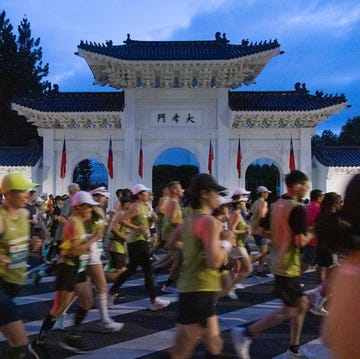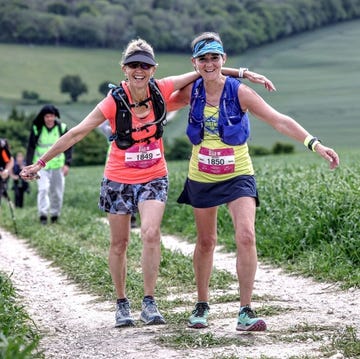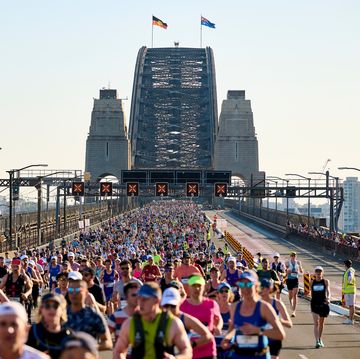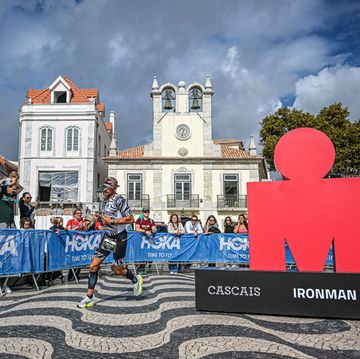Week 15
London Winter Run 2025: A runners guide!
Where can I do parkrun this Christmas
Final week before the marathon and I’m torn between the discomfiting sense that I ought to be doing something and the poleaxing desire to just wait for Sunday. I know I won’t become fitter if I run, but I have never read a taper plan that advises doing nothing more vigorous than sitting on the sofa, eating pasta and enjoying the sensation of not being tired. So, in deference to all those people who know far more about running than I do, I resist the urge to do that very appealing nothing. However, since tapering is about doing less, I plan to end my taper on a high by doing much, much less.
I’ve been feeling some pain deep in my heel, so I skip the run on Monday. I head out for a short one on Tuesday and on Wednesday I endure a final session on the elliptical trainer. I suspect I’m staying active for psychological reasons, to feel I am keeping my body on its toes, letting it know I’m not done with it yet, not by a long, long way. I know that my glycogen, hormone and enzyme levels will return to normal as I ease off, but I can’t feel this; I just have to believe it’s happening and trust that it will play a part in keeping me going on Sunday.
People keep asking me if I’m looking forward to the race: the answer is still “Not really.” I’ve been told the crowds are amazing and that their support is invaluable, but the truth is I don’t really like being surrounded by people. Probably should have considered that before I signed up for one of the biggest races in the world
Battersea Park Half Marathon: All you need to know
(I’m using the past tense here, because this is all behind me now)
Rain was forecast and so as we (me, my girlfriend and a friend who had flown in from the US to run the race) ate breakfast at 7am, a bruiser of a shower muscled its way overhead, dumped its contents and then headed off to bully someone else, leaving the air heavy and damp. The day was cold, too, so I decided to wear running tights, a long-sleeved top, a beanie and my gloves. We all wore cheap sweatshirts we would discard just before the race began. All in all, not the kind of gear I was expecting to be wearing on April 24th.
In our race pen we pulled bin liners over our heads for extra warmth and drank weak (but free) coffee. Just before the race began the grey sky began to tear itself into clouds and swatches of blue appeared. Then the sun came out. It was still cold but this was good running weather. We began to move very slowly to the start line, and then we were running.
From the beginning the support was extraordinary. English people have a reputation for being reserved, but it’s impossible to reconcile that with the boisterous, full-throated and ceaseless cheering and applause that was ours to soak up and draw strength from along almost every mile. I found myself regularly making my way to the edge of the course to high five the many tiny hands poking out from the throng. I also grabbed for proffered jelly babies, though more often than not I succeeded only in slapping them from those same tiny hands, which slowly curled into tiny fists and slipped back into the crowd. I felt terrible.
I was planning to stick close to the 4:30 pacers, one of whom was my colleague Joe, but at only the one-mile mark I needed to use the toilet, even though I had done so only 30 minutes earlier. I nipped into the urinals and was back out quickly but the 4:30 banner was already far ahead. I began to pick my way past slower runners to get it in sight again and once I did I settled into my pace. I felt good, I was enjoying the crowd far more than I ever would have believed and I thought – I may even have said aloud – this is going to go well.
And so it did, very well, for about 20 miles. I stayed on pace, drank plenty of water, took two gels and ate sweets whenever my coordination was up to the task. The first sign of trouble was the jittery twitch in my left calf that told me cramp was on the way. I moved over to the side of the road and stretched it on a kerb.
“Are you all right?” asked a man in the crowd. I nodded bravely, which is harder than it sounds. Just as I was preparing to return to the race, I heard a familiar voice: “Pick it up, Carroll!” It was my girlfriend and she looked very comfortable and deeply smug as she raced by. I looked first at her and then at the women in the crowd who were laughing with her and at me.
“I’d better get on, so,” I said.
She was soon lost in the mass of runners, but I could still see the 4:30 banner taunting me from about 100 metres ahead. I tried to make up the distance, but something was happening to my body. First the cramp began to threaten again, and then I began to feel a tingling in the fingers of both hands, and I could sense the cold air settling on me and seeping into my bones. I had taken off my hat and gloves miles ago, so I pulled them back on to try to stay warm. It didn’t work. I flexed my fingers to get the blood moving, but it did no good. That was just the beginning of a long, increasingly painful and worrying six miles.
At mile 21 (which I actually misread as mile 22 until I was close), my windpipe seemed to narrow and harden; I was finding it hard to breathe deeply. I decided to walk for a time and breathe slowly through my nose. This seemed to work, but each time I picked up speed again, the deeply troubling sensation returned after a few hundred metres. Then the cramp returned.
I made for the side again and stretched. I must have looked as uncomfortable as I felt, because a woman in the crowd asked, “Do you want some water?”
I nodded and she handed me a fresh bottle. I fumbled with the cap and so she took it from me, flipped it open and handed it back. I didn’t want to sully it with my dry, cracked lips so I squeezed the bottle from a couple of inches away and let the water jet into my mouth. As I handed it back she said, “Do you want to keep it?”
I gave her what I hoped was a smile of gratitude, shook my head and returned to the race. The 4:30 banner was too far ahead now, a tiny fluttering wave goodbye, and then it was out of my sight. All I could do now was try to finish. I had written my name on the back and front of my top, but now I was regretting it. People were calling out to me, trying to gee me along, encourage me, bolster my spirits: “Come on, John.” “Nearly there, John.” “One more effort, John.” “Just a few more miles, John.” Earlier on, whenever anyone called my name, I’d catch their eye, raise a hand or smile to acknowledge how much it meant to me, but now I wanted to be anonymous, I wanted to disappear into the mass of runners and hope no one could see how much trouble I was in. For 20 miles the crowd had supported my every step, whether they knew it or not; now I felt under pressure to continue, to not let them down. I know how idiotic and egotistical and irrational that sounds now, but my brain was operating as little more than a pilot light by this stage.
At one point I heard from behind me, “Come on, John C, you’re almost there.” What on earth did another runner see as he approached that caused him to try to spur me on? Was I weaving? Stumbling? Sending up a flare?
I was determined to finish the race at a run, not a walk, and so when I turned onto The Mall I told myself to begin running. I had friends in the stands and I looked for them, and was grateful I could not see them. I crossed the line in 4:45:50, almost 16 minutes behind my planned time, but I did it. And that’s when things got worse.
I asked the first marshal I saw where I could get some water. He said, “Further along, after you get your medal.” This was placed around my neck and then I collected my T-shirt, feeling dizzy and uncoordinated. I was seeing dots explode, reform and burst again in front of my eyes and knew I had to sit down. When I did, in the middle of the finishers’ area, another runner came over to me with a bottle of sports drink.
“Here, drink this. You need some sugar in you.”
I said thanks and fumbled with the cap, drank a little and slowly got to my feet. Out of the way of others coming through the finish, I leaned against a crash barrier, then slid to the ground. My breath was short and shallow and I was blinking rapidly to try to keep the world in focus. A pair of legs appeared by my side. I raised my heavy, bobbling head and looked up a man wearing the green of St John Ambulance.
“Best wireless headphones?”
I shook my head, which made me want to vomit. I stopped shaking my head.
“OK, we’re going to get you into a chair and bring you to the tent.”
He and a colleague helped me into the chair and wheeled me inside the long white first aid tent. Someone asked how I felt.
“Dizzy, spots,” I managed, gesturing vaguely in front of my eyes. My arms were heavy and floppy.
Where can I do parkrun this Christmas.
“Hard to breathe?” she asked.
I nodded.
“Do you want to lie down?”
I nodded again and they helped me down. Each volunteer, as well as the nurse, the physio and the doctor, told me their names as they came to me, but I can’t remember them, I’m sorry to say. I began to shiver, so they brought me a foil blanket and then a pale-blue woollen one, but my body continued to shudder. My blood pressure was taken (it was lower than they would have liked), as was my blood sugar level (I can’t recall the result). I was given some sports drink to sip, to help bring up my blood pressure, and some Skittles to eat. After some minutes they got me to my feet. For a moment I felt better, then everything fell apart very quickly.
“I can’t breathe properly,” I said thickly. “Feel very distressed. Need to lie down.”
They lay me down again and it was decided that my core body temperature needed to be determined. How was this done? Well, it’s colder than you might think and has to remain in situ longer than seems decent. During this indignity, volunteers stood around me holding blankets as a screen.
“It’s a little high, 38.2,” I heard someone say.
For the next half an hour (I think), they took superb care of me, telling me to breathe slowly, reminding me to eat and drink, and chatting to help keep me calm. When my left calf cramped so brutally that I was crying out, the physio worked it slowly and gently: “Try to relax the leg. Let me take the weight. Good. No, don’t cross it over the other leg.”
Someone else went to collect my backpack and helped me remove my soaked running top and pull on some dry clothes. The shivering continued. My body seemed to be panicking and was trying all the tricks it knew to warn me that something was wrong and to keep me going, but the result was that I was frightened by what had happened and what might happen.
They continued to watch over me as the shivering eased and my thinking became clearer. I phoned my emergency contact and told her where I was, that I was OK. My pulse and blood pressure were checked a few more times and they finally seemed satisfied that I was recovering. When I was able to stand without fearing I was about to fall or throw up, the relief I felt almost made me weep. I limped to the exit, thanking everyone who had looked after me. I wanted to hug them all, but didn’t have the strength.
My girlfriend finished in 4:37, my American friend in just under five hours (she had not trained for almost a month, so fair play to her). We went home and talked about the race for a long time, though my enjoyment of that discussion was marred by a fierce bout of post-exercise rhinitis that caused me to sneeze for most of the evening and the next day. Now that’s exhausting.
So there it is. I trained for it, I ran it, I did not hit my planned time and I collapsed at the end, for reasons I do not really understand, given that I drank regularly, took gels, ate sweets and didn’t try to go faster than was sensible. It just happened.
Was doing the marathon a worthwhile experience? Definitely. I learned a great deal about myself (most of which is positive) and, on the day, felt better disposed towards other people than I usually do: the support on the course would lift the spirits of the most jaded and the expressions of concern when I was falling apart will not be forgotten. Will I run another marathon? At the moment, with the postrace distress fresh in my mind, I would say no. Then again, I once said, “Why on earth would I want to run 26 miles? I wouldn’t walk it, so why would I want to run it?” I am sometimes a very stupid man.













